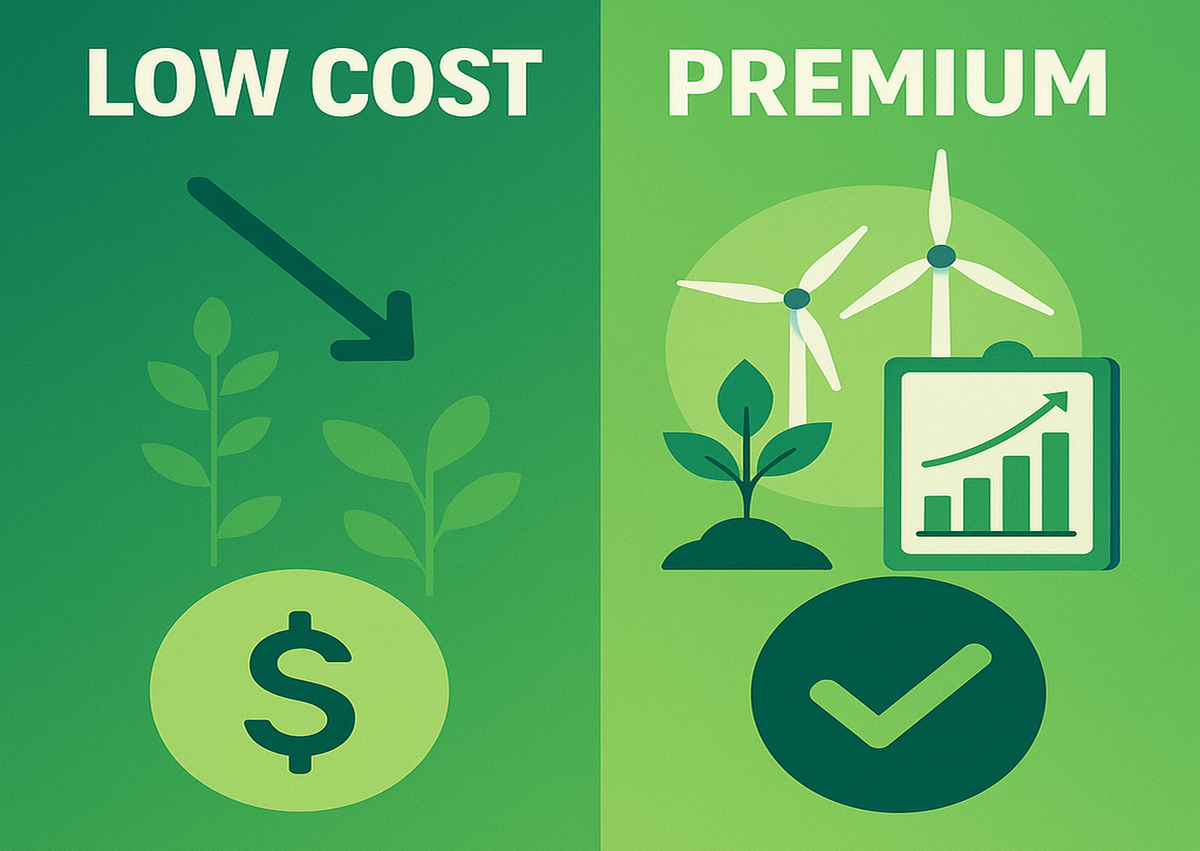Critical analysis of “low cost” and excellence models in environmental consulting. We reflect on the responsibility of consultants, promoters and administrations in the face of a drift that compromises quality, professional ethics and, above all, the protection of the environment.
Under the title of this post, we discuss two totally antagonistic strategies resulting from the economic cycle in which we live and which, from the outset, we should not associate with greater or lesser economic benefit, but with a degree of professional responsibility or business ethics.
This post would make for an encyclopedia of 156 volumes, so we have preferred to focus on some basic concepts, those that we are most clear about, although they are not exempt from discussion and replication, an answer that we always try to happen when we share an opinion calmly with our followers.
Nor do we want to question the strategic policies of each company, among which it is legal to find the criterion of reducing prices below costs, since it is a respectable practice, although perhaps not desirable as a recurring or long-term line, just as the term low cost should not be understood as a pejorative by definition.
The title and introduction are valid for any professional sector and are even cross-cutting concepts that we have already discussed in previous posts such as “responsible shopping”, “the price of an EIA” or “ecological intelligence”, and that in our case we have seen fit to deal with environmental consulting after 16 years of experience.
Along these lines, we already want to state that the general feeling of the sector is one of discouragement, or at least the one we detect in forums and professional circles.
It is tiring to see that researchers and consultants with proven solvency develop protocols, methodologies, guides and reference manuals for the preparation of environmental studies that serve as a basis for companies and the administration, some of them even being integrated into specifications and tenders by the “final beneficiaries”, to then verify how they are applied or misinterpreted, either unconsciously or deliberately, both by bidders and tenderers, making disproportionate discounts on service offers, generating comparisons with large differentials in prices and scope, or simply not valuing the real scope of the work to be done.
This means that those of us who try to correctly and coherently interpret the requirements, without being “more papist than the pope”, are unable to cover them properly at a competitive price, staying out of the market, or even sometimes generating distrust in the customer, who sees more than significant deviations in resources compared to “exceptionally competitive” offers.
What is going on? How is it possible that there are companies that offer the same services but at prices well below cost assuming they know the technical details? Well, it happens and it's also common. In fact, the situation has been repeated since the approval of the first environmental assessment laws, but in recent years and due to the crisis it has worsened to scandalous extremes.
In fact, we have entered a period where it seems that in the environmental field the important thing is to cover the file regardless of the quality of the results (“almost anything goes”), which would be consistent if there were no clearly defined rules of the game, and that is not the case.
While there is a clear tendency towards excellence in other markets, environmental markets have been filled with environmental companies that, without meeting minimum quality requirements and scientific-technical rigor, easily and deliberately sneak their reports to promoters and administrations without having major consequences. Being a fraud or scammer seems to be free, or rather, it pays off, because it doesn't involve any risk, there are no repercussions or consequences. And all in spite of the fact that the Article 16. of Law 21/2013 on Environmental Assessment specifically states that authors must have”sufficient technical capacity” and that they will be”responsible for their content and for the reliability of the information”. Once again, environmental laws are left on paper.
Faced with situations like this, professional consultants, their responsible clients and rigorous environmental bodies are at a clear disadvantage or difficult decision-making scenario (offer, contracting and validation respectively), all of them being stuck between a rock and a rock:
- If we fall into the vicious circle of increasingly lower prices, consultants to remain in the market and bidders to justify their correct management and austerity criteria, we are entering a system in which “anything goes” and the only criterion is economic.
This guarantees the bidder the hiring of low-quality work and doubtful compliance with criteria and deadlines, although at a good price, and forces consultants to lose ethics and rigor, or to the total security of bankruptcy and business failure, despite optimizing their processes, since no one gives hard to four pesetas (at most hard by hard). Getting into this game also undermines credibility and negatively affects the internal management of their human, technical and economic resources.
- Staying firm in the commitment to rigor and productive optimization while remaining faithful to a value that is curiously also fashionable, that of “excellence”, and expecting that it, sooner or later, will be rewarded or will end up winning the pulse of “low cost”, costs many bidders the pressure of administrations or economic sections, which only contemplate savings in initial investment and not so much in the obvious benefits of a job well done.
This second option, although it dignifies the consultant, is more uncertain, since maintaining the price to offer quality and being truthful with what is offered can place you out of hiring options if the business universe that surrounds you has aligned itself with the model aggressive low cost, which is what seems to be happening. This, for consultants with fewer “kidneys” or with a less comprehensive client base, may even cost them their survival.
In this context, we place the blame on some of the companies we have called Low cost, accusing them of poor ethics, unfair competition, low quality and professional intrusiveness (without going into the reasons that motivate this attitude, since we are aware that one of them may be the economic situation we are going through). And while it is true that this type of Consultants they are primarily responsible for the situation, they are not the only actor in the play. More ingredients float in this broth. The fact is that promoters, but above all environmental administrations, play an important role in the recipe.
Promoters and companies they share responsibility for the source of the problem, mainly for accepting offers without stopping to evaluate if they really meet the minimum requirements or if they are receiving what they have actually tendered and paid for. Although it is true that, in most cases, these promoters are not specialists in the field, and they precisely execute the contract to delegate to a consultancy firm that supposedly is a professional, the tendency to reduce expenses by opting for the highest bidder who complies with the procedures, makes them complicit in this situation. In this regard, remember that environmental regulations do not exempt them from submitting reliable and rigorous work. Their responsibility, although minor, exists and should be assumed normally and in a generalized way.
However, in our opinion, the key, not an accusation free of self-criticism, is found in the bank's third leg: environmental administrations or bodies.
They are the ones who have the obligation to ensure compliance with laws and therefore that derivative works are executed in accordance with the standard. Environmental technicians must have sufficient knowledge, professional zeal and tools to know how to distinguish grain from chaff and thus be able to reject all fraudulent or low-quality work that does not provide the necessary information to properly evaluate projects. Their actions should always be based on rigor and require that every study be properly argued and referenced, with well-defined and justified efforts, and methodologies based on current scientific knowledge. In addition, the data provided should be scrupulously reviewed and collated to be able to define precisely if what is presented fits the effort made and, above all, if it meets the required information needs. The administrations, and the technicians who compose them, must be the main filter to avoid farces, since they are the ones that finally approve the studies and are not subject to market fluctuations or, in principle, to any other type of external pressure. Unfortunately, this is not always the case, just as the reason for this decline is not always the lack of budgetary resources.
But the fact is that public administrations, because of their dual status as auditor and purchaser, should be the first to set an example when they hire, and unfortunately it seems that the trend in the public sector is also towards the most aggressive “low cost”, with some public tenders whose only assessment is practically economic, with technical definitions and criteria that in many cases are lax, or with few means for monitoring and monitoring compliance with what has been contracted or where the “drop in temerary” is no longer penalized.
In the end, the main victims are professional companies (consultants and promoters), the technicians that make them up, the quality of the management of our environment and, by extension, and first of all the ENVIRONMENT. Decision-making based on low-quality information and the deprofessionalization of consulting involves erroneous strategies, waste of public and private money, loss of jobs and general discredit.
The solutions are not unique or simple, but they are possible.
- On the one hand, promoters must be responsible for what they present, as required by law, and not hide behind ignorance and delegation of functions. These are their projects and they have the obligation to ensure compliance with the standard and at the same time be ethical, especially in a business world where concepts such as Corporate Social Responsibility (CSR) are increasingly important.
- At the same time, environmental consultants would have to face labor intrusion and fraud companies (both small and large) that, by adding the term environment to their services, undermine the credibility of others and sink the market with poor quality products. The creation of professional groups or scaled quality criteria could be a good start.
All this without forgetting that the purpose of our activity (environment) is just as important as managing it under a profitable and competitive business model and plan, with an emphasis on continuous improvement in order to always offer the customer the best possible quality/price ratio or optimal assistance (using productivity improvements, working on innovation, etc.).
- Finally, and probably the main element in solving this problem, are the administrations, which must improve control systems, being demanding and making their staff even more professional, so that quality filters are established that are robust enough so that poor studies are not considered valid; as well as providing them with economic, technical and human resources to make it possible.
It is, therefore, a triangle formed by consultants, administrations and promoters, each with their own degree of involvement and responsibility, and where there is still much to say and even more to do; starting with ourselves, which is why this post and our desire to improve with tools such as a strategic plan.
We believe that the solution will only come from a constructive dialogue involving all the parties involved and from making “responsibility” part of our decisions. A dialogue that today is very timid, and with which we have to start as soon as possible if we don't want the problem to become irreversible or tend to a “chronic extensive low cost” mode that is not in accordance with the principles of evolution that in reality we all bet on.


.avif)


.avif)




